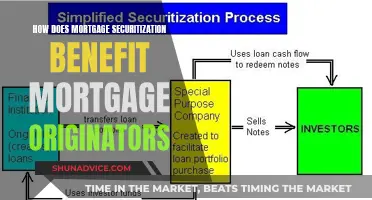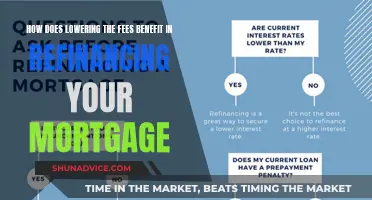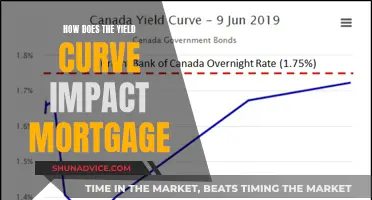
Applying for a mortgage is a big step, and it's important to be prepared. There are a number of factors to consider when deciding when to apply for a mortgage, such as your income, credit score, and the current interest rates. Lenders will want your mortgage payment, including taxes and insurance, to be between 25% and 28% of your gross monthly income. You'll also need to consider the down payment, which is typically around 20% of the purchase price, as well as closing costs, which can range from 2-6%. It's recommended to have a stable income and a good credit score before applying, as this will increase your chances of approval and getting a favourable rate. The entire process, from application to closing, can take anywhere from two weeks to two months, so it's important to plan ahead and be organized with your paperwork.
| Characteristics | Values |
|---|---|
| Time taken for the entire process | 2 weeks to 2 months |
| Time taken for closing a mortgage transaction | 43 days on average |
| Time taken for preapproval | Minutes or hours |
| Time taken for credit decisions | 1 day to 2 days |
| Down payment | 3.5% to 20% |
| Closing costs | 2% to 6% |
| Repair and maintenance costs | 1% |
| Monthly mortgage payment | Not more than 28% of take-home income |
| Total monthly debt load | Not more than 36% of income |
| Credit score | 760 to 800 |
| Debt-to-income ratio | 25% to 28% |
What You'll Learn

Credit score
Your credit score is a key factor in securing a mortgage. Lenders use it to determine how likely you are to repay your home loan on time and in full. A higher credit score will also help you get the best mortgage rates.
Applying for a mortgage can impact your credit score in several ways. Firstly, when you apply for a mortgage, the lender will perform a "hard inquiry" or "hard pull" on your credit report, which can cause a small drop in your credit score. This is because credit scoring models lack evidence to show that you will successfully make your payments on time. However, this initial drop is only temporary and minor, and it should not significantly affect a lender's decision.
The impact of multiple credit checks can be mitigated by ensuring they are done within a specific time frame. For FICO scores, this window is typically 45 days, while VantageScore allows for a 14-day period. During these periods, multiple credit checks will be recorded as a single inquiry on your credit report.
Once you have a mortgage, making timely payments will improve your credit score over time. Payment history accounts for 35% of your credit score and is the biggest factor in its calculation. Therefore, consistently making your payments on time and in full will positively impact your credit score.
On the other hand, missing a mortgage payment or failing to pay in full can negatively affect your credit score. This can result in a lasting impact on your credit report, as a late payment will remain on your record for seven years, although its effect will lessen over time.
You can check your credit score before applying for a mortgage to determine if you need to improve it. You can also use a credit monitoring service to ensure the accuracy of your credit report.
Mortgage Rates: Impacting Your Monthly Payment Costs
You may want to see also

Down payment
When it comes to applying for a mortgage, there is no one "right" time. It depends on a variety of factors, including your financial situation, credit score, and income stability. However, understanding the components of a mortgage application, such as the down payment, can help you prepare and determine the best time to apply.
The down payment is the amount of money you pay upfront when buying a home. It is a percentage of the total purchase price and demonstrates your commitment and financial capability to the lender. A higher down payment reduces the risk for the lender and can lead to lower interest rates and monthly payments. Conventional loans typically require a minimum down payment of 3% to 5%, while a 20% down payment is ideal for avoiding additional fees and private mortgage insurance. Government-insured loans, such as VA, USDA, and FHA loans, offer alternative options with lower or no down payment requirements. It's important to consider your financial situation, income, credit score, and debt-to-income ratio when deciding on the down payment amount.
To illustrate the impact of the down payment, let's consider an example. Suppose you are taking out a 30-year conventional mortgage of $300,000 with an interest rate of 6%. With a down payment of 5%, the upfront cost would be $15,000, resulting in monthly payments of $1,709. On the other hand, increasing the down payment to 20% would require a higher upfront cost of $60,000 but would reduce the monthly payments to $1,439. Over the life of the loan, the larger down payment would save you $97,200 in interest costs.
While saving for a 20% down payment can be challenging, it offers significant advantages. It lowers your monthly payments, increases your home equity, and may help you avoid mortgage insurance. Additionally, a larger down payment can improve your chances of securing a lower interest rate. However, it is essential to weigh your options and consider your financial circumstances before deciding on the down payment amount.
In conclusion, the down payment is a crucial aspect of the mortgage application process. It directly impacts your interest rate, monthly payments, and overall financial commitment. By understanding the relationship between the down payment and these factors, you can make an informed decision that aligns with your financial goals and capabilities. Remember to seek guidance from mortgage professionals and utilize tools like mortgage calculators to estimate the potential costs and identify the best time to apply for a mortgage based on your down payment savings.
Gifts, Mortgages, and Parental Money: Impact and Insights
You may want to see also

Income
Lenders typically want your total mortgage payment, including taxes, insurance, and private mortgage insurance, to be between 25% and 28% of your gross monthly income. For example, if you earn $6,000 per month, a mortgage payment between $1,500 and $1,680 is generally considered affordable. Alternatively, you can multiply your annual income by two or three to estimate a comfortable house price range. In this case, an annual income of $72,000 would translate to a house price between $144,000 and $216,000.
To qualify for a mortgage, you must provide proof of income. This typically includes pay stubs, bank statements, and tax returns for the past two years. If you are self-employed, lenders may request additional documentation, such as tax returns, to verify your income. It is essential to be honest about your income and not overstate it, as you will need to provide evidence, and doing so may delay your application and reduce the amount you can borrow.
Before applying for a mortgage, it is advisable to start the process early by obtaining mortgage preapproval. This will help you understand your budget constraints and focus your property search on homes within your financial means. Lenders will evaluate your financial situation, including your income, to issue a preapproval letter indicating how much they are willing to lend you and at what interest rate. A stellar credit history and a steady income can lead to a higher preapproval amount and better interest rates.
Additionally, maintaining a stable employment history and providing accurate financial documentation are crucial. If you have recently changed jobs or are at the beginning of your career, it may be beneficial to wait a few years for your income and employment to stabilize before applying for a mortgage.
Mortgage Debt Proceeds: Co-Paying Strategies and Options
You may want to see also

Lender
When it comes to applying for a mortgage, timing is critical. The first step is to analyse your current income and expenses, including debt payments, to determine what size of monthly mortgage payment will fit into your budget. A standard rule of thumb is the 28/36 rule, where not more than 28% of your take-home income should go towards home-related costs, and not more than 36% of your income should be spent on your total monthly debt load. Lenders will also want your total mortgage payment, including taxes, insurance and private mortgage insurance, to be between 25% and 28% of your gross monthly income.
It is important to research and compare lenders to find the best mortgage rates. Shopping around and applying with multiple lenders will allow you to compare offers and find the lowest rate. Many lenders have online application portals, which can offer faster processing times and convenience, but may not be suitable for individuals with complicated finances. If you are self-employed or have recently experienced a significant financial change, such as bankruptcy or divorce, it may be easier to explain your situation in person.
Before applying for a mortgage, it is recommended to get pre-approved by a lender to borrow a given loan amount. Lenders will review your personal information, credit report, income documentation and assets to evaluate how much you may be eligible to borrow. You will need to provide personal information, such as your Social Security number and ID, income verification, federal tax returns, bank statements and proof of other debts and assets.
Once you have found a home you would like to buy, you can start the actual mortgage application process. It is important to carefully fill out the application as completely and accurately as possible, disclosing any credit problems upfront. The entire process, from application to closing, can take anywhere from two weeks to two months.
To avoid potential delays, it is beneficial to be transparent about your finances and provide all the required documents. Interest rates fluctuate frequently, so you may want to consider locking in your rate with your lender when you submit your application to protect yourself against rising interest rates.
Zillow's Mortgage Balance Knowledge: What's the Source?
You may want to see also

Online vs in-person
The mortgage application process can be lengthy and tedious, requiring a lot of paperwork. You can choose to apply for a mortgage online or in person, each with its own set of advantages and disadvantages.
Online applications are often faster and more convenient. Many lenders have online portals where you can easily upload documents, such as bank statements, pay stubs, and tax returns, without needing to provide hard copies. Online-only lenders also tend to have more advanced technology, allowing them to provide pre-approvals within minutes or hours and credit decisions within a day or two. Additionally, online applications give you the flexibility to apply at any time without being restricted by business hours. However, submitting personal information online always carries some risk, and online lenders may not necessarily offer lower interest rates.
Applying for a mortgage in person allows you to interact directly with a loan officer, which can be beneficial if you have a complex financial situation or unique circumstances, such as self-employment, divorce, or bankruptcy. An in-person application can provide a more personalized experience and guidance throughout the process, which may be preferable for first-time homebuyers. Moreover, in-person applications can help you avoid the time commitment required to fill out extensive personal information when obtaining rate quotes from multiple lenders.
Whether you choose to apply online or in person, it is essential to start the mortgage process as early as possible. Getting pre-approved or obtaining a "mortgage in principle" before finding a property can help you understand your budget and increase your chances of having your offer accepted by sellers. It also demonstrates to estate agents and sellers that you are a serious and creditworthy buyer.
In summary, both online and in-person mortgage applications have their advantages. Online applications offer speed and convenience, while in-person applications provide personalized guidance and may be better suited for more complex financial situations. Ultimately, the decision depends on your personal preferences, financial needs, and level of comfort with sharing personal information online.
Mitigating Risk: Strategies in the Mortgage Industry
You may want to see also
Frequently asked questions
There is no one "right" time to apply for a mortgage. However, it is recommended that you apply for a mortgage when you have a stable income and a good credit score. You should also consider how much you can afford for a down payment and whether you can afford the monthly payments.
To apply for a mortgage, you will need to provide personal information, income verification, federal tax returns, bank statements, and proof of other debts and assets. You may also need to provide additional documentation depending on your circumstances and the type of mortgage you are applying for.
The entire process, from application to closing, can take anywhere from two weeks to two months. The closing process usually requires an in-person meeting, even with online lenders.
Yes, you can apply for a mortgage online. Online applications can offer faster processing times and convenience, but they may not be suitable for individuals with complicated finances or who don't fit the typical borrower profile.







